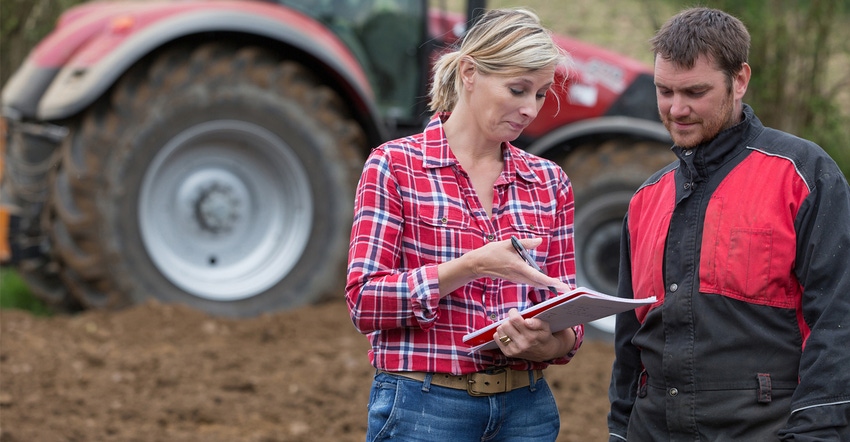April 30, 2018

My husband I milk about 70 cows, and I work in town. Our full-time employee was let go to reduce expenses. I could quit my job to work on the farm. It’s either that or hire part-time help. What’s best option?
Mike Evanish: Be totally honest about realities
Four questions immediately came to mind. I’ll tackle maybe the hardest one first:
• How well do you get along? It’s one thing to have a happy marriage when both spouses have their space and careers they love. It can be quite another to work side-by-side every day, all day. Admitting personality challenges within a marriage is very hard. But this is so important that nothing short of total honesty will do.
• How much do you earn? In the current dairy economy, every dollar matters. Review what you’re earning and just how much “part-time help” will cost. Sure, wages are the largest component of hiring, but they aren’t the only cost.
Add in Social Security, workers' compensation insurance plus the cost of any other benefits like a side of beef, perhaps uniforms, etc. Don’t forget the cost of tracking wages and filing forms by your accountant. Considering all costs, a $15 per hour employee can easily cost you over $20.
• What benefits do you receive? Use great care before giving up a full-time job to work part-time on the farm. If you work for a company with over 50 employees, they’re generally required to supply health insurance or pay a penalty. Given that health insurance for a family can cost $18,000 per year or more, leaving a job can carry a high cost.
I’d also place company 401K contributions in this category. Just like a part-time employee carries other cost beyond wages, your job most likely provides benefits that must be considered.
• Can the farm financially afford you? Your full-time employee was let go for a reason. If it was due to cash flow issues, be very careful. I’d never advise placing all your eggs in a basket that has cash flow problems. If the employee was let go for an employment reason, say mistreatment of animals, proceeding with your evaluation is in order. But in my experience, family usually gets paid last.
Dale Johnson: Rethink your business plan
Certainly, 70 cows can’t justify a full-time employee. It was a good decision to let that person go. I’m sure your husband is trying to cover most of the workload himself. But there are times when an extra hand is needed. It might pay to bring them in on occasions when extra help is needed.
You’re likely making more than what you’d pay a part-time employee, and you’re generating much needed cash flow. That’s especially true if you’re both on a group health insurance plan through your employer. That’s much more affordable than purchasing health insurance on your own.
It is important to consider what you want to do. Would you rather be working on the farm? Or do you like your job in town and want to stick with it? Farm needs shouldn’t always trump personal desires.
While you’re analyzing employment issues, encourage your husband to consider employment options. I don’t foresee a time when milking 70 cows won’t be a penny-pinching business that drains enjoyment. As a dairy farmer, your husband has management and other skills that may get a better return off the farm.
George Mueller: 70 cows is a difficult size
A 70-cow dairy may be a good size if you have no debt and want to show your children great work habits and thrift as they work with all the miracles of heifer raising, cow care and crop production. But building a farm business that’ll support an easy transition to your next generation requires a substantially larger herd.
Since you didn’t mention children, I’ll consider options without them. Seventy cows is a two-worker farm, often needing additional part-time help.
If you have a good town job you enjoy, I wouldn’t quit it to join your husband in a full-time struggle — unless you really love dairy farming and want to do your best to help turn the farm around. It won’t be easy!
There are other options: Selling the cows and having your husband get a job in town while you both do a little crop farming is possible. Or renting out the farm and taking a well-earned vacation. Or selling the farm and keeping your house. Or selling your house also, and moving to town.
Whatever your decision, your farm background and experience will benefit you both the rest of your lives. Your farm background is precious. May God bless you in your eventual decision.
Got a question? Our experts await!
Our Profit Planner panel would like to hear it. The panel consists of Michael Evanish, farm business consultant and business services manager of Pennsylvania Farm Bureau’s Members’ Service Corp.; Dale Johnson, Extension farm management specialist at University of Maryland; George Mueller, dairy farmer from Clifton Springs, N.Y.; and Glenn Rogers, University of Vermont Extension professor emeritus and ag consultant (unavailable for this question).
Send your questions to “Profit Planners,” American Agriculturist, 5227 Baltimore Pike, Littlestown, PA 17340. Or e-mail them to [email protected]. All are submitted to our panel without identification.
You May Also Like




